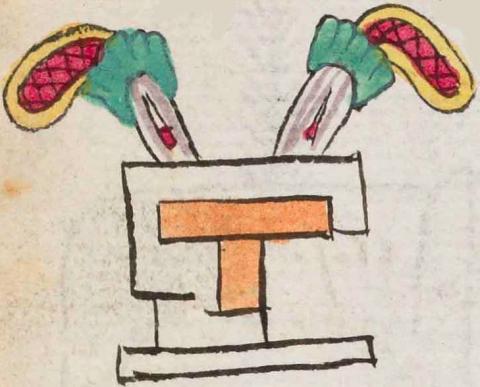Mizquic (Mdz20v)
This compound glyph for the place name Mizquic has two principal elements. One is the mesquite tree (mizquitl), represented by two branches with blossoms or seed pods springing forth. The tree parts have many colors, white or gray, green, red, and yellow. The red part is criss-crossed and it is outlined by the yellow. The other is a house or building (calli), which provides a silent locative, a semantic indicator for the locative suffix -c (short for -co, in or at). The house (in profile) is the standard white with terracotta-colored, t-shaped beams. The entrance to the house is on the viewer's right.
Stephanie Wood
The word mizquitl entered Mexican Spanish as mesquite, which came into English from the Spanish. As shown in other glyphs for this place, this is a small leguminous tree from the genus Prosopis, and it has straight, robust spines. The red color of the spines here may suggest that they were used for bloodletting in auto-sacrifice.
Stephanie Wood
mizquic. puo
Mizquic, pueblo
Stephanie Wood
c. 1541, or by 1553 at the latest
Stephanie Wood
trees, árboles, bushes, arbustos, mesquite, nombres de lugares

mizqui(tl), mesquite, https://nahuatl.wired-humanities.org/content/mizquitl
-c (locative suffix), in or at, https://nahuatl.wired-humanities.org/content/c
"Mesquite Place" [Frances Karttunen, unpublished manuscript, used here with her permission.]
"On the Mesquite" (Berdan and Anawalt, 1992, vol. 1, p. 193)
"El Lugar del Mesquite"
Codex Mendoza, folio 20 verso, https://digital.bodleian.ox.ac.uk/objects/2fea788e-2aa2-4f08-b6d9-648c00..., image 51 of 188.
The Bodleian Libraries, University of Oxford, hold the original manuscript, the MS. Arch. Selden. A. 1. This image is published here under the UK Creative Commons, “Attribution-NonCommercial-ShareAlike 3.0 License” (CC-BY-NC-SA 3.0).






